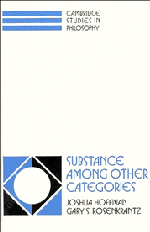Book contents
- Frontmatter
- Contents
- Acknowledgments
- Introduction
- 1 Substance and other categories
- 2 Historically prominent accounts of substance
- 3 Collectionist theories of substance
- 4 The independence criterion of substance
- 5 Souls and bodies
- Appendix 1 The concrete–abstract distinction
- Appendix 2 Continuous space and time and their parts: A defense of an Aristotelean account
- Index
Appendix 1 - The concrete–abstract distinction
Published online by Cambridge University Press: 18 September 2009
- Frontmatter
- Contents
- Acknowledgments
- Introduction
- 1 Substance and other categories
- 2 Historically prominent accounts of substance
- 3 Collectionist theories of substance
- 4 The independence criterion of substance
- 5 Souls and bodies
- Appendix 1 The concrete–abstract distinction
- Appendix 2 Continuous space and time and their parts: A defense of an Aristotelean account
- Index
Summary
A concrete name is a name which stands for a thing; an abstract name is a name which stands for an attribute of a thing.
J. S. Mill A System of Logic I. ii. § 4 (1846)Realists and antirealists presuppose an intuitive distinction between abstracta and concreta in their debates about the problem of universals. Examples of abstracta are squareness (a property), betweenness (a relation), there being horses (a proposition), the null set, and the number 7. Examples of concreta are a stone (a material substance), God (a disembodied spiritual substance), Hurricane Andrew (an event), instants and seconds (times), points and expanses of space (places), the particular wisdom of Socrates (a trope), the sum of Earth and Mars (a collection), the Earth's surface (a limit), and shadows and holes (privations). It is desirable that a philosophical analysis of the concrete–abstract distinction allow for the possibility of entities of any intelligible sorts, given some plausible view about the nature, existence conditions, and interrelationships of entities of those sorts. This desideratum seems to require allowing for the possibility of entities of the aforementioned kinds. Six attempts have been made to analyze the concrete–abstract distinction.
Unlike abstracta, concreta are spatially located or spatially related to something.
Unlike abstracta, concreta are capable of moving or undergoing intrinsic change.
Concreta have contingent existence, whereas abstracta have necessary existence.
Unlike concreta, abstracta are exemplifiable.
Unlike concreta, abstracta are (intellectually) graspable.
Unlike abstracta, concreta can be causes or effects.
- Type
- Chapter
- Information
- Substance among Other Categories , pp. 182 - 187Publisher: Cambridge University PressPrint publication year: 1994

